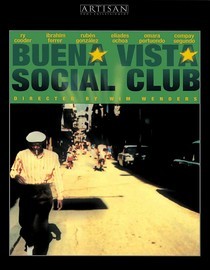*************************
Two weeks ago I was sick. I had a fever for a few days, moved only to refill on fluids, and I watched A LOT of movies. It seemed I had exhausted all the movies I could stomach from the Netflix instant que, when I came upon a documentary featuring one of my favorite albums: Buena Vista Social Club.

(Or you can watch it on YOUTUBE!!)
This documentary takes us to Havana, where the actual Buena Vista Social Club thrived in the 40s and 50s. However....
(wikipedia):
"Shortly after the Cuban Revolution of 1959, new Cuban President Manuel Urrutia Lleó, a devout Christian, began a program of closing or nationalizing all gambling outlets, nightclubs, and other establishments associated with Havana's hedonistic lifestyle. This had an immediate impact on the livelihoods of local entertainers. As the Cuban government rapidly shifted towards communism and an effort to build a "classless and colorblind society", it struggled to define policy toward forms of cultural expression in the black community; expressions which had implicitly emphasized cultural differences. Consequently, the cultural and social centers were abolished, including the Afro-Cuban mutual aid Sociedades de Color in 1962, to make way for racially integrated societies... The measures meant the closure of the Buena Vista Social Club."
To make a long story short, this club boasted the best of Cuba's musical talent... vocalists, pianists, guitarists, the heart and soul of Cuban culture, which by the 1990s were largely forgotten. In 1996, nearly 50 years after the closure of the Club, american guitarist Ry Cooder and Cuban bandleader Juan de Marcos González after intending to record a collaboration between Cuban and African Highlife musicians, were unable to do so because the musicians from African could not get their visas. Instead they decided to tap the local talent and record an album of Son Cubano music. The rest, as they say, is history.
This is an introduction to the group directly from the documentary, starting with singers Ibrahim Ferrer & Omara Portuondo, two of the best singers to ever come out of Cuba. Absolutely stunning voices.
(The link may not work because i'm illegally embedding it, but follow it to youtube):
The talent and stories only get better from there. One by one they introduce and share the stories of other legendary Cuban artists such as singer Compay Segundo (who was 90 when the album was being recorded) and piano player Rubén González (who was 77 at the time).
This movie was a true sensory delight. The sights. The sounds. The emotion. The history. I had listened to the album dozens of times, but after watching the movie and listening to it again, it had a brand new richness for me. I think one of the ultimate reasons I love music is because it is so much bigger than the individual compositions alone. It can invoke feelings and memories, all the while documenting the soul of a person, a group, a culture, and even a nation.
Many of these men are dead now, but because of this music their names, their culture, their country, and the Buena Vista Social Club will live forever.